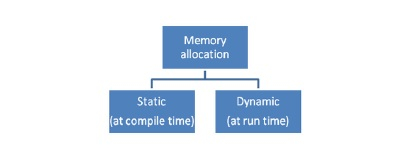Home >Backend Development >C++ >In C programming, what does static memory allocation mean?
In C programming, what does static memory allocation mean?
- 王林forward
- 2023-09-14 15:21:011086browse
Memory can be allocated in the following two ways:

Static memory allocation
Static variables are defined in an allocated space block with a fixed size. Once allocated, it cannot be released.
Allocate memory for declared variables in the program.
You can use the "&" operator to get the address and assign it to the pointer.
Memory is allocated at compile time.
It uses the stack to maintain static allocation of memory.
In this kind of allocation, once the memory is allocated, the memory size cannot be changed.
Low efficiency.
The final size of the variable is determined before the program runs, which is called static memory allocation. Also known as compile-time memory allocation.
We cannot change the size of variables allocated at compile time.
Example 1
Static memory allocation is usually used for arrays. Let’s do a sample program taking an array as an example:
Demonstration
#include<stdio.h>
main (){
int a[5] = {10,20,30,40,50};
int i;
printf (“Elements of the array are”);
for ( i=0; i<5; i++)
printf (“%d, a[i]);
}Output
Elements of the array are 1020304050
Example 2
Let’s consider another example to calculate an array The sum and product of all elements in −
Real-time demonstration
#include<stdio.h>
void main(){
//Declaring the array - run time//
int array[5]={10,20,30,40,50};
int i,sum=0,product=1;
//Reading elements into the array//
//For loop//
for(i=0;i<5;i++){
//Calculating sum and product, printing output//
sum=sum+array[i];
product=product*array[i];
}
//Displaying sum and product//
printf("Sum of elements in the array is : %d</p><p>",sum);
printf("Product of elements in the array is : %d</p><p>",product);
}Output
Sum of elements in the array is : 150 Product of elements in the array is : 12000000
The above is the detailed content of In C programming, what does static memory allocation mean?. For more information, please follow other related articles on the PHP Chinese website!
Related articles
See more- C++ compilation error: A header file is referenced multiple times, how to solve it?
- C++ compilation error: wrong function parameters, how to fix it?
- C++ error: The constructor must be declared in the public area, how to deal with it?
- Process management and thread synchronization in C++
- How to deal with data splitting problems in C++ development

